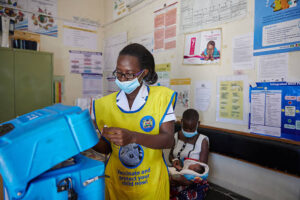Twelve African countries are set to receive a total of 18 million doses of the first-ever malaria vaccine over the next two years, marking a crucial step forward in the battle against one of the continent’s leading causes of death.
The allocation of doses has been determined using the principles outlined in the Framework for Allocation of Limited Malaria Vaccine Supply, which prioritizes areas with the highest need and the highest risk of malaria illness and death among children.
Since 2019, Ghana, Kenya, and Malawi have been administering the RTS,S/AS01 malaria vaccine through the Malaria Vaccine Implementation Programme (MVIP).

This initiative, coordinated by the World Health Organization (WHO) and funded by Gavi, the Vaccine Alliance, the Global Fund to Fight AIDS, Tuberculosis and Malaria, and Unitaid, has already vaccinated over 1.7 million children in these countries.
Also, read; Tanzania Faces Shortage of Pilots, Struggles to Hire Expensive Foreigners
The vaccine has proven to be safe and effective, significantly reducing severe malaria cases and child mortality.
In addition to Ghana, Kenya, and Malawi, nine more countries, including Benin, Burkina Faso, Burundi, Cameroon, the Democratic Republic of the Congo, Liberia, Niger, Sierra Leone, and Uganda, will introduce the vaccine into their routine immunization programs for the first time as part of this initial 18 million dose allocation.
The first shipments of the vaccine are expected to arrive in these countries during the last quarter of 2023, with the roll-out scheduled to begin in early 2024.

Thabani Maphosa, Managing Director of Country Programmes Delivery at Gavi, the Vaccine Alliance, expressed optimism about the impact of the vaccine, stating, “This vaccine has the potential to be very impactful in the fight against malaria, and when broadly deployed alongside other interventions, it can prevent tens of thousands of future deaths every year.”
Malaria remains a deadly disease in Africa, claiming the lives of nearly half a million children under the age of 5. The introduction of the malaria vaccine is seen as a significant step toward preventing these deaths and providing children with a better chance of survival.
As the supply of the vaccine increases, it is hoped that even more children across the continent will benefit from this life-saving advancement.

